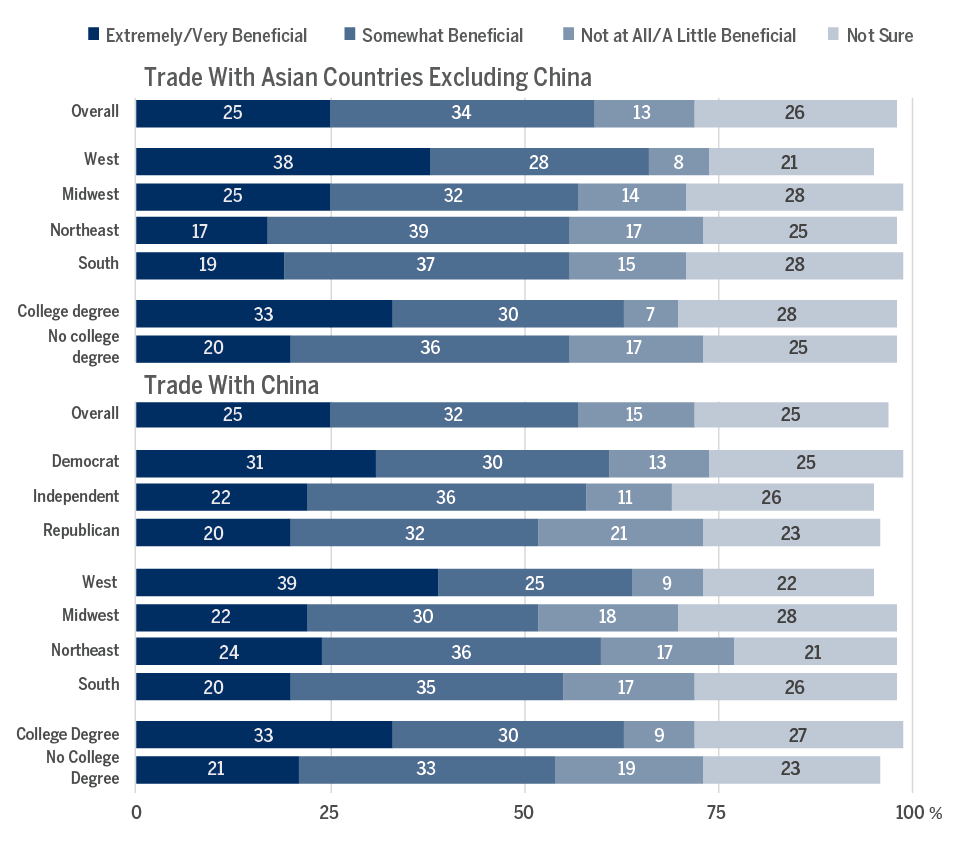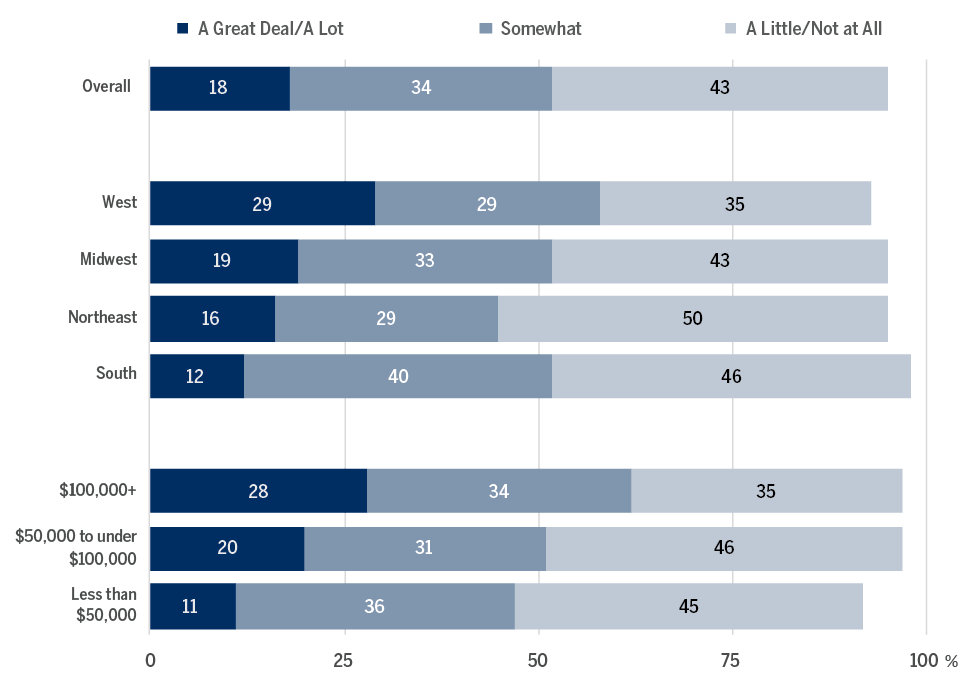The following article is part of an ongoing series of analyses based on the recent Asia Matters for America Public and Elite Opinion poll. See all articles in the series here.
A poll conducted by NORC at the University of Chicago for the East-West Center suggests many adults in the United States view trade with countries in Asia as beneficial. When asked if trade with countries in Asia excluding China is beneficial, 59% of respondents viewed trade as very or somewhat beneficial. Most respondents in the West (66%) considered trade as extremely beneficial (38%) or somewhat beneficial (28%). Other regions [1] had lower but similar responses such as Midwest (57%), Northeast (56%), and South (56%). A small percentage (13%) of overall responses said trade has little or no benefit.
HOW BENEFICAL HAS TRADE WITH THE FOLLOWING STATES BEEN FOR YOUR STATE?
Percent of adults

Although this suggests respondents see trade as beneficial, responses on the importance of the state of the Asian economy were much lower. Over half (52%) of respondents said the state of the economy in Asia matters a lot or somewhat, and 43% said the economy matters a little or not all. Regionally, 29% of respondents from the West, 16% from the Northeast, 19% from the Midwest, and 12% from the South said the state of the economy in Asia matters a lot. There appears to be a disconnect between perceptions of trade with countries in Asia and the importance of the Asian economy. Why is there less agreement on how the Asian economy matters to their state if respondents believe trade with Asia matters?
HOW MUCH DOES THE STATE OF THE ECONOMY IN ASIA MATTER TO YOUR STATE?
Percent of adults

This disconnect appears most striking when comparing exports from the regions. For instance, states in the Northeast exported an estimated $95 billion in goods and services to Asia, but the South exported $188 billion, nearly double. Nonetheless, the South appears to value trade and the importance of the economy less compared to the Northeast. Why? Data from a Pew Research Center analysis of Brookings Institution "Export Monitor 2018" revealed the most export-dependent counties in the United States tend to be smaller, less economically diversified, such as in the South and Midwest. Additionally, most export-dependent counties rely on a single industry or sometimes a single plant for most of their exports. People in these counties may be more aware of the impact the state of the Asian economy has on their own, particularly in its demand for US exports. While this still does not explain the low results from the South, it may explain why more respondents from the Midwest said trade benefits their state a lot compared to respondents in the Northeast. Although examining exports is only part of the trade relationship between the United States and Asia, these observations further underscore how trade should matter to regions with poll results showing less belief in the importance of Asian trade compared to other regions. Furthermore, it highlights how export-dependent states should be more engaged with the state of the economy in Asia if it affects the export industry.
However, the poll also reveals other factors that impact perceptions of trade aside from region. Of polled adults with a college degree, 63% stated trade with Asian countries excluding China is very or somewhat beneficial to their state. This is 7% higher than respondents with no college degree at 56%. Furthermore, 17% of adults with no college degree answered trade has little to no benefit, a 10%- difference compared to respondents with a college degree. These results show education level may be a factor is people’s understanding of trade with Asian countries, with higher education level associated with the belief trade with Asia and the Asian economy matters to their state. Of the polled adults who made an annual income of $100,000 or more, 62% believed the state of the economy in Asia matters a great deal or somewhat. Of the adults who made less than $50,000, 48% believed the state of the economy in Asia matters a great deal or somewhat, a 14% difference. A study conducted by the Federal Reserve Bank of St. Louis concluded there is a strong correlation between education and money. If this is the case, respondents who made $100,000 or more and respondents who have a college degree may share similar views on the benefits of trade and the importance of the Asian economy. This would suggest that within the respondents, those with higher education and wealth see the connection between trade benefits and the state of the Asian economy. This also suggests class is a factor in adult perceptions of trade benefits and the economy in Asia.
The findings of this poll suggest a disconnect between perceptions of the benefits of trade with countries in Asia and the importance of the Asian economy. Respondents generally believed trade with Asian countries benefits their state, but there is less consensus that the Asian economy matters to their states. Regionally, this disconnect is less apparent in respondents from the Western United States and most apparent in respondents from the South and Midwest. However, this regional disconnect is not consistent throughout. The poll also suggests those in higher classes (more educated and wealthier) saw the link between trade benefits with Asian countries and the Asian economy. The disconnect is regional, and the connection is class-based. To understand why this is the case and to show the link between trade and the Asian economy among Americans, it is important to pose questions that dissect where the disconnect comes from.
Mimi MacKilligan is a former participant in the Young Professionals Program at the East-West Center in Washington. She is a graduate student at the George Washington University studying International Affairs with a double concentration in International Security Studies and Asia.
Asia Matters for America Poll Analysis is a series of short articles exploring the results of the recent survey by the East-West Center and conducted by the NORC at the University of Chicago on American perspectives on US-Asia relations. Authors examine a segment of the results from the report regarding trade, tourism, international students, immigration, human rights, national security, and sister city relationships to attempt to understand how Americans believe Asia matters to their state.
[1] Please refer to the map on page 4 of the report.